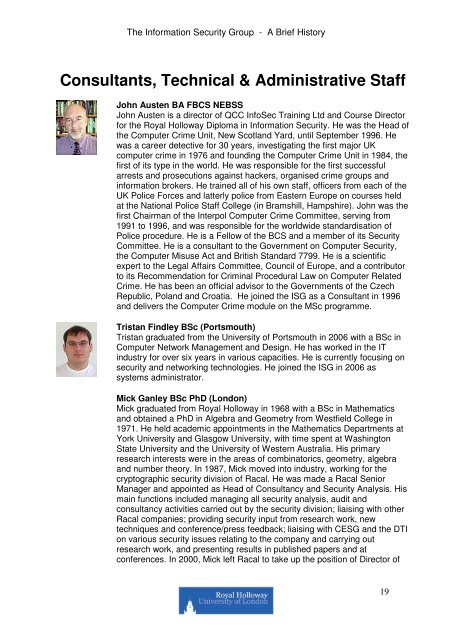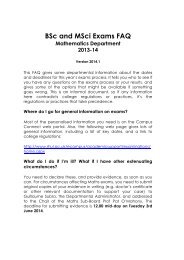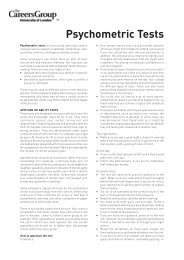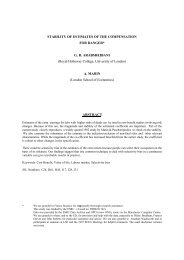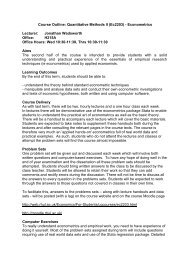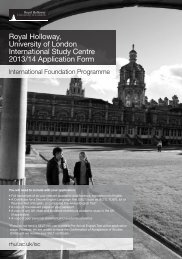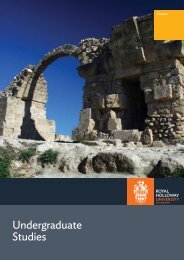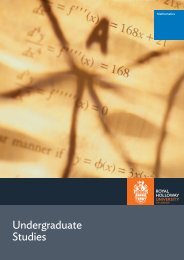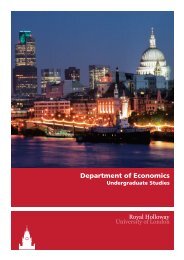a short history of the ISG - Royal Holloway, University of London
a short history of the ISG - Royal Holloway, University of London
a short history of the ISG - Royal Holloway, University of London
You also want an ePaper? Increase the reach of your titles
YUMPU automatically turns print PDFs into web optimized ePapers that Google loves.
The Information Security Group - A Brief History<br />
Consultants, Technical & Administrative Staff<br />
John Austen BA FBCS NEBSS<br />
John Austen is a director <strong>of</strong> QCC InfoSec Training Ltd and Course Director<br />
for <strong>the</strong> <strong>Royal</strong> <strong>Holloway</strong> Diploma in Information Security. He was <strong>the</strong> Head <strong>of</strong><br />
<strong>the</strong> Computer Crime Unit, New Scotland Yard, until September 1996. He<br />
was a career detective for 30 years, investigating <strong>the</strong> first major UK<br />
computer crime in 1976 and founding <strong>the</strong> Computer Crime Unit in 1984, <strong>the</strong><br />
first <strong>of</strong> its type in <strong>the</strong> world. He was responsible for <strong>the</strong> first successful<br />
arrests and prosecutions against hackers, organised crime groups and<br />
information brokers. He trained all <strong>of</strong> his own staff, <strong>of</strong>ficers from each <strong>of</strong> <strong>the</strong><br />
UK Police Forces and latterly police from Eastern Europe on courses held<br />
at <strong>the</strong> National Police Staff College (in Bramshill, Hampshire). John was <strong>the</strong><br />
first Chairman <strong>of</strong> <strong>the</strong> Interpol Computer Crime Committee, serving from<br />
1991 to 1996, and was responsible for <strong>the</strong> worldwide standardisation <strong>of</strong><br />
Police procedure. He is a Fellow <strong>of</strong> <strong>the</strong> BCS and a member <strong>of</strong> its Security<br />
Committee. He is a consultant to <strong>the</strong> Government on Computer Security,<br />
<strong>the</strong> Computer Misuse Act and British Standard 7799. He is a scientific<br />
expert to <strong>the</strong> Legal Affairs Committee, Council <strong>of</strong> Europe, and a contributor<br />
to its Recommendation for Criminal Procedural Law on Computer Related<br />
Crime. He has been an <strong>of</strong>ficial advisor to <strong>the</strong> Governments <strong>of</strong> <strong>the</strong> Czech<br />
Republic, Poland and Croatia. He joined <strong>the</strong> <strong>ISG</strong> as a Consultant in 1996<br />
and delivers <strong>the</strong> Computer Crime module on <strong>the</strong> MSc programme.<br />
Tristan Findley BSc (Portsmouth)<br />
Tristan graduated from <strong>the</strong> <strong>University</strong> <strong>of</strong> Portsmouth in 2006 with a BSc in<br />
Computer Network Management and Design. He has worked in <strong>the</strong> IT<br />
industry for over six years in various capacities. He is currently focusing on<br />
security and networking technologies. He joined <strong>the</strong> <strong>ISG</strong> in 2006 as<br />
systems administrator.<br />
Mick Ganley BSc PhD (<strong>London</strong>)<br />
Mick graduated from <strong>Royal</strong> <strong>Holloway</strong> in 1968 with a BSc in Ma<strong>the</strong>matics<br />
and obtained a PhD in Algebra and Geometry from Westfield College in<br />
1971. He held academic appointments in <strong>the</strong> Ma<strong>the</strong>matics Departments at<br />
York <strong>University</strong> and Glasgow <strong>University</strong>, with time spent at Washington<br />
State <strong>University</strong> and <strong>the</strong> <strong>University</strong> <strong>of</strong> Western Australia. His primary<br />
research interests were in <strong>the</strong> areas <strong>of</strong> combinatorics, geometry, algebra<br />
and number <strong>the</strong>ory. In 1987, Mick moved into industry, working for <strong>the</strong><br />
cryptographic security division <strong>of</strong> Racal. He was made a Racal Senior<br />
Manager and appointed as Head <strong>of</strong> Consultancy and Security Analysis. His<br />
main functions included managing all security analysis, audit and<br />
consultancy activities carried out by <strong>the</strong> security division; liaising with o<strong>the</strong>r<br />
Racal companies; providing security input from research work, new<br />
techniques and conference/press feedback; liaising with CESG and <strong>the</strong> DTI<br />
on various security issues relating to <strong>the</strong> company and carrying out<br />
research work, and presenting results in published papers and at<br />
conferences. In 2000, Mick left Racal to take up <strong>the</strong> position <strong>of</strong> Director <strong>of</strong><br />
19


